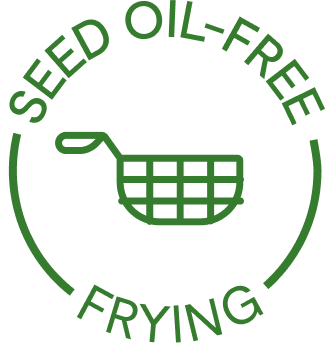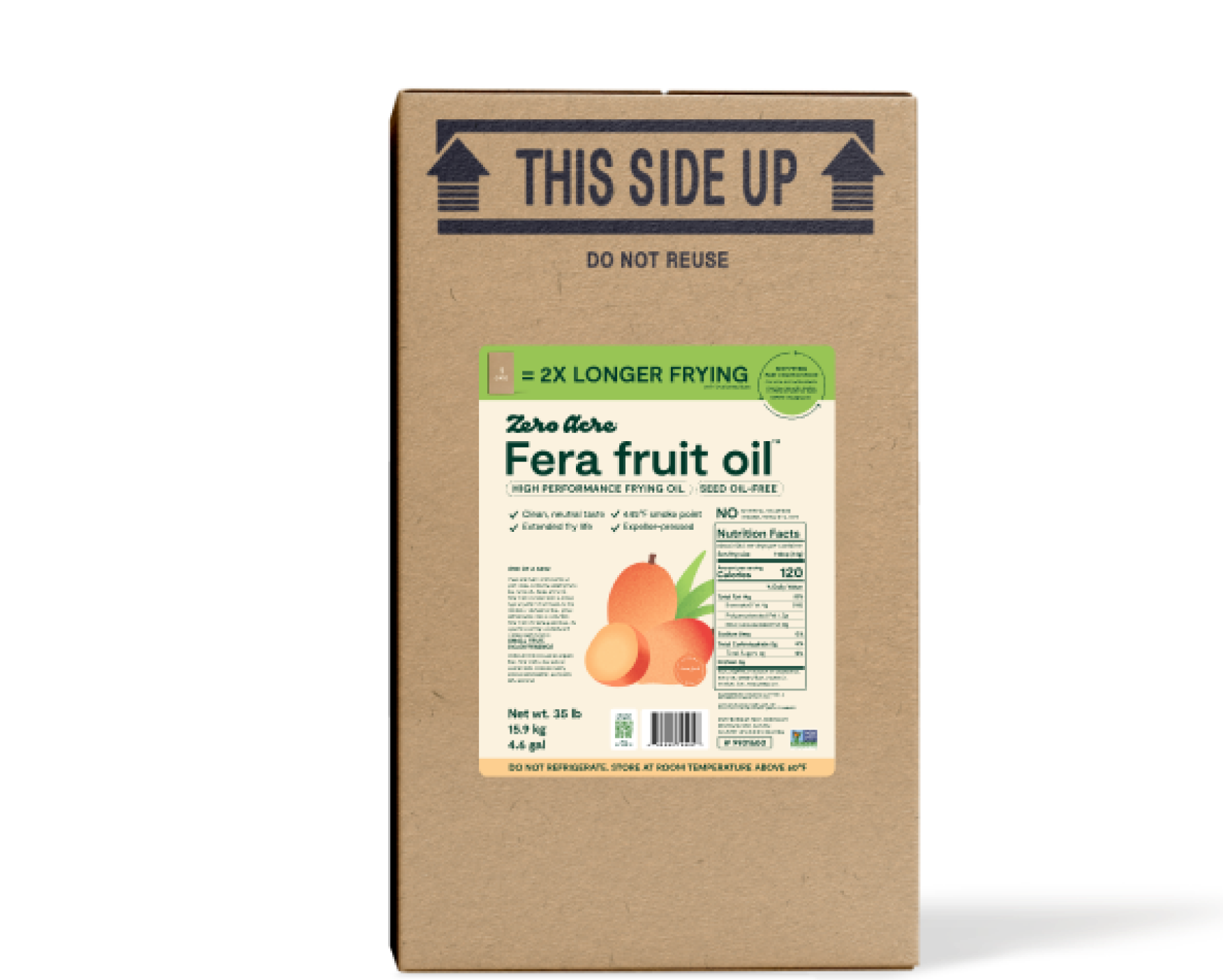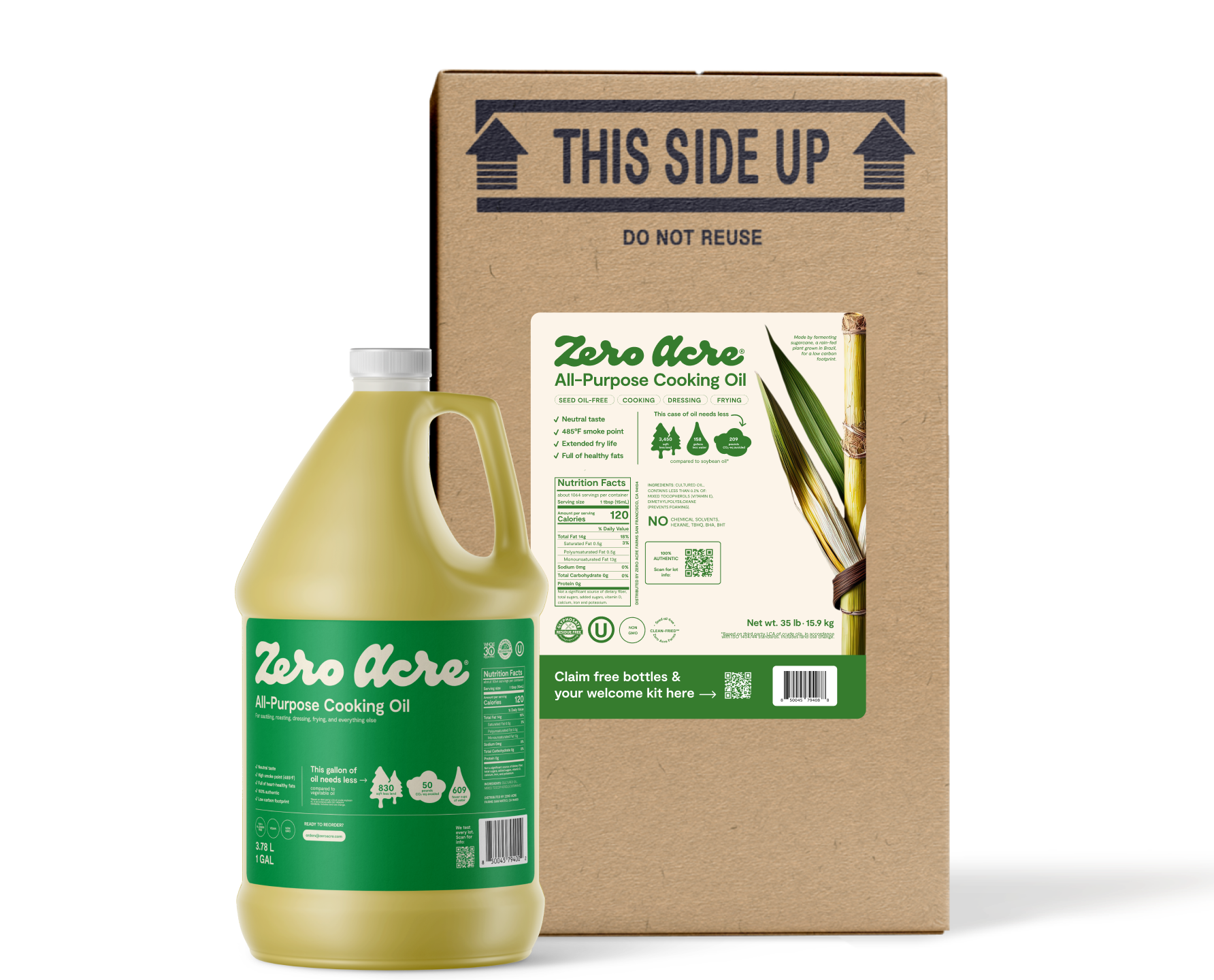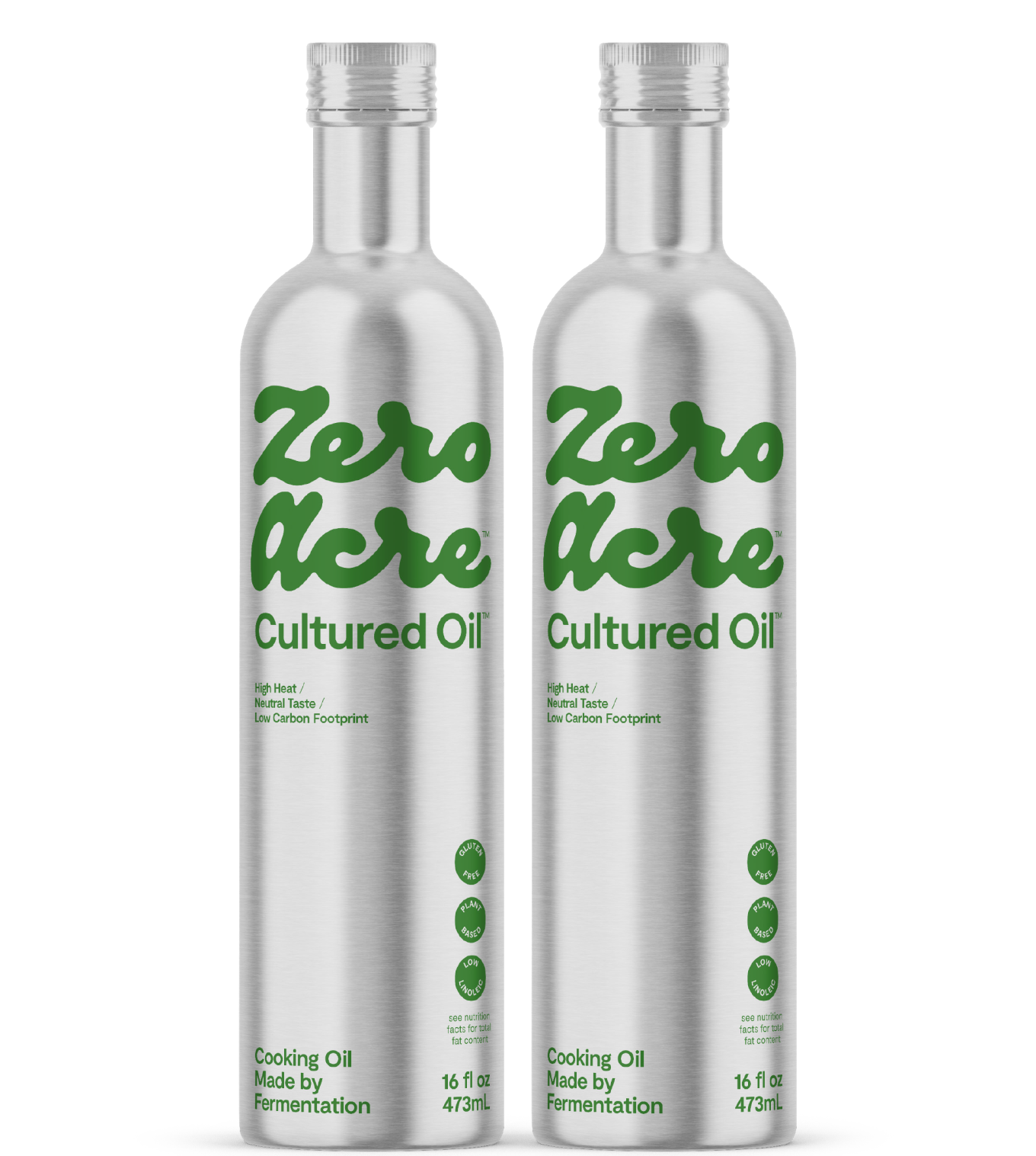WRITTEN BY: The Zero Acre Editorial Team
Article at a Glance
Holiday gatherings may be rife with seed-oil filled foods like fried appetizers, mayo-based dips, and packaged, processed snacks.
By making your own seed oil-free dishes to share, you can enjoy the holiday spirit while also limiting your own seed oil consumption.
Holiday gatherings can be a great place to start conversations about the benefits of swapping out seed oils with friends and family.
Zero Acre oil makes a perfect holiday gift, just in time for a seed oil-free challenge in January.
Introduction
Holidays are often all about indulgences. Halloween, Thanksgiving, Hanukkah, and Christmas beckon us with festivities full of joy, shared memories with friends and family, and a lot of delicious food.
It can be difficult to be both fully immersed in the holiday festivities and prioritize your health. You may be wondering just how you’ll get through the holiday season without undoing your goal of eliminating seed oils from your diet. We’re here to encourage you that it’s not completely impossible!

We’ve rounded up our top 10 tips below for enjoying the holidays while also avoiding seed oils.
10 Ways to Avoid Toxic Seed Oils Over the Holidays
1. Avoid Fried Foods at Restaurants
When dining out over the holidays, one easy way to avoid seed oils is to steer away from fried foods on the menu. Most restaurants use commercial seed oils for frying because they are cheap, widely available and have a neutral flavor profile. Unfortunately, due to their high polyunsaturated fat content, seed oils are some of the most unstable oils and are the easiest to oxidize, particularly at high temperatures used in cooking.
Reusing frying oil is an extremely common practice in restaurants. Vegetable oil that’s been repeatedly reheated and reused contains significantly more oxidized byproducts than oil used for frying once [*]. And every time a seed oil is reheated or reused, trans fats form from the breakdown of unstable polyunsaturated fats [*]. The more times the oil is used for frying, the more of those harmful trans fats and oxidized byproducts end up in the dish.
Your best bet for avoiding seed oils at holiday gatherings and catered events where fried foods are served is to opt for fresh, baked, grilled or slow cooked options instead. Unless, of course, you know the host used an air fryer or a stable oil like Zero Acre oil in cooking. Then — enjoy away!
2. Be Aware of Salad Dressings
It’s true that many salads are brimming with an array of nutrients and can be both delicious and nourishing. Fat in salad dressing serves an important purpose beyond making it taste more satisfying. Many of the vitamins and micronutrients found in dark leafy greens and colorful fruits and vegetables are considered fat soluble, meaning they need a fat molecule “buddy” to be most effectively absorbed into your bloodstream.
Salads need fat, but they don’t need seed oils.
Unfortunately, if you flip over the bottle of most store bought salad dressings, you’ll find that they’re almost always made with some type of seed oil like canola, sunflower or soybean — even if they’re marketed as an “olive oil” based dressing.
The best way to limit seed oils in your salad dressing is to make it yourself using better oils like Zero Acre oil or a carefully sourced olive oil. You can also opt for whole-food sources of fat like whole seeds, nuts, avocado, cheese, and olives, where the polyunsaturated fats are less concentrated, unprocessed and less likely to oxidize.
3. Make Holiday Treats Yourself
One of the largest shares of seed oil in the food system comes from ultra-processed, packaged foods. And some ultra-processed, packaged foods might be the very holiday treats you look forward to enjoying every year. If you’re hoping to reduce your seed oil consumption around the holidays, you can make a big impact by making some of your favorite treats yourself.
Try your hand making your own potato chips, whip up a seed oil-free dark chocolate peppermint creamer for your coffee, or make your own holiday cookies. Homemade holiday goodies also make great gifts for friends and family — an easy way to continue spreading the word about seed oil-free cooking.

4. Swap the Oil in Your Favorite Recipe
Does your favorite heirloom recipe call for canola oil, corn oil or another vegetable oil made from seeds? Don’t worry — we’re not going to tell you to toss the recipe in the trash. Thankfully, Zero Acre oil looks, feels and behaves a lot like vegetable oil in recipes (and has a much healthier fatty acid profile) so it’s an easy switch to make. Savor and enjoy without hesitation! We’re sure grandma won’t mind.
5. Bring Your Own Dish to Share
Holiday gatherings are often all about the food. For good reason — holiday food is special and can amplify the joy of the season’s memories. Holiday gatherings are also a great time to bring a seed oil-free dish (or two) to share. Make a batch of crowd-pleasing creamy roasted garlic dip, or chunky guacamole and serve with homemade tortilla or pita chips. You can rest assured you’ll have something delicious to enjoy that doesn’t have hidden seed oils, and you can impress everyone with how scrumptious your Zero Acre oil recipe tastes.

6. Eat Before You Go Out
Eat something before heading out. Not to spoil your appetite, but to ensure you’re able to avoid getting “hangry” around a table full of fried appetizers. This can be especially helpful if you’re not sure what food options will be available, or are quite sure that most of the options served will be filled with seed oils (packaged snacks, fried foods, mayo-based dips, etc.). Having a snack that keeps your blood sugar stable and leaves you with a comfortable level of hunger will make it easier for you to fill up a plate full of seed oil-free foods and still be satisfied, not longing for what’s “off limits.”
Remember — you don’t have to turn down every morsel of holiday food that could contain seed oils since that might be unrealistic. But you will be less likely to over-do it if you don’t arrive at the gathering overly hungry.
7. Educate Family and Friends About Seed Oils
Bringing your own dish to a gathering is a great way to open a door to a conversation about the ingredients you chose to use — or not use. Friends and family may be interested to learn about why you care whether there are seed oils in your own food. You may choose to “plant some seeds” about the increasing use of vegetable oils across the globe and the links between high omega-6 intake and health risks. Share with family how you first learned about seed oils and how it surprised you at first, too, to learn just how prevalent they are in our food supply. No need to start any food fights (unless you want to, of course). You know your friends and family best, and what type of conversation they may be open to. Proceed with care.
8. Ask About Ingredients
It might seem like a hassle to ask your server, or family and friends about the oils and fats in their food, but it can make for interesting conversation (see tip number 6, above). If your friends and family are particularly interested in sustainability, cooking, or health, they may be interested to hear more about seed oils and be receptive to spreading awareness.
Since folks with food allergies need to be aware of what’s in their food, most servers at this point should be trained to be transparent about what ingredients are used in the kitchen. If you find that the dish in question is, in fact, made with seed oils, inquire whether they may be able to accommodate shifting to a less-offensive option like avocado oil, olive oil, or coconut oil (or recommend they look into cooking with Zero Acre oil).
If your diet permits it, real butter (not margarine) is another lower linoleic acid option that restaurants may be willing to cook your food in. Alternatively, some restaurants may be willing to cook your food without any oil or fat. Many restaurants may still be using seed oils for most food preparation, so do your best, and don’t sweat one meal.
Our hope is that if consumers demand better oils and fats, restaurants and food companies will switch to better oils and fats. Someone has to lead the charge!
Pro-tip: Download an app like Seed Oil Scout or Seedy to find local restaurants or products that are seed oil free.
9. Look at Labels
These days, seed oils lurk where you’d least expect them. Flip over the label on a jar of pre-chopped garlic and you might be surprised to find canola oil on the ingredients list. You probably don’t expect cookies, candies, and other desserts to be made with seed oils, but many commercially prepared snacks and treats are.
This can be a great opportunity to learn more about what’s in your favorite holiday foods and to explore new seed oil-free alternatives.
10. Gift Zero Acre Oil
Finally, if you’re looking for a holiday gift that truly keeps on giving, wrap up a bottle of Zero Acre oil and pass it on. Your foodie friends will appreciate getting to test out a new ingredient and your family members will be excited to embrace something you value. Plus, the more Zero Acre oil we all share in our pantries, the less you’ll have to worry about avoiding seed oils in the future. Major win.

The Takeaway
The Holidays are a time of celebration, memory making, indulging, and savoring time with friends and family. It’s possible to enjoy the holidays and limit your seed oil consumption with a few key tricks. But don’t beat yourself up if you do end up eating seed oils. The holiday season makes up a small part of your overall diet, and what you do most of the time has the greatest impact.
Seed oils are still all over our food supply and we’re just getting started advocating for change. One of the most important things you might be able to do this holiday season is start a conversation and share the benefits of swapping out seed oils with those you care about.

Roasted Beet Dip with Goat Cheese and Honey
This unique roasted beet dip with goat cheese and honey is quick to prep and boasts multiple layers of delicious flavor.

What Are Seed Oils And Should You Avoid Them?
Seed oils are a rich source of linoleic acid, an omega-6 fatty acid linked to heart disease, diabetes, autoimmunity, neurological disease, and more.





